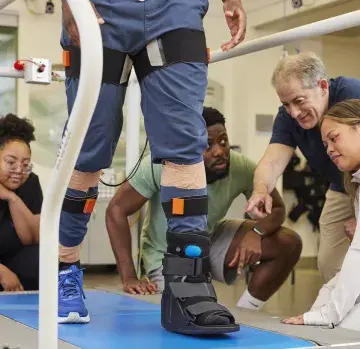A BSN Student’s Guide to Getting More Scholarships
Student Voices is a blog series written by SMU students. If you have an idea for a story, reach out to Sasha Solomonov at ssolo@samuelmerritt.edu. This article is written by BSN student Darnisha Turner.
Let’s not mince words. College is expensive, and private colleges are often even more so. When counselors would talk to me about the abundance of scholarships available to support my pursuit of a bachelor of science degree in nursing, I would get bogged down with stress and doubt over the likelihood of winning one.
Here’s what I learned: every dollar you earn from a scholarship is free money, or money you don’t have to pay back. What’s even better is that every dollar of scholarship money can be used to pay down your debt.
Starting from that perspective, I created a system that allowed me to generalize yet personalize each scholarship application. Here are a few of my tips and recommendations that have helped me win over $6,000 outside of institutional scholarships in less than a year:
1. Own your story
Who are you and what makes you different from other applicants? Who or what motivates you to continue to push forward when things get hard and you want to quit? We all have a unique story, trials and triumphs that make us who we are and no one is better at telling your story than you are. When preparing to write a scholarship essay, you only have a few hundred words to convince the person on the other side of the table to invest in your future, so figure out the most concise way to tell them how amazing you are.
2. Start a running document of questions
A lot of scholarships have a similar theme of questions such as “How have life experiences shaped who you are today?” or “Why did you choose nursing and what are your future goals and aspirations?” or “What involvement have you had in the healthcare field besides required clinical work?” Use Google Docs to create a running list of questions you come across, and to maintain a bank of possible answers to use as a jumping off point for future essays.
3. Give faculty advanced notice
Ask for letters of recommendation in advance. Most scholarships require a faculty member (both in class and clinical) to evaluate your performance. When considering who you would like to write these letters of recommendation, make sure you give them ample amount of time to vouch for you because faculty schedules are notoriously busy. With that in mind, it’s wise to have other professors lined up so if someone cannot deliver a letter on time, you’ll have a backup plan.
4. No amount is too small
Every dollar of scholarship money won is one less dollar of debt to pay back. Scholarships are free money! As wonderful as it would be to win a large lump sum at one time to cover the cost of tuition and expenses, a $100 scholarship to start off with, in addition to a $200 scholarship here and a $700 scholarship there, is still $1,000. Don’t be discouraged by the amount—remember that money adds up.
5. Don’t forget to say thank you
Regardless of the dollar amount of money won, it is important to thank the individuals and organizations who were willing to invest in your future. Take a few moments to write a thank-you letter on a stationary card to express your appreciation. On one occasion, I sent a thank-you note to a donor and they wrote back letting me know how much it meant to them and asked if there was anything else they could do to help me with along the way. Experiences like this remind me that kindness and consideration go a long way.
6. Where to look for scholarships
At many schools, you’ll find a categorized list of scholarships through the Financial Aid Department, filtered by the field of nursing you wish to pursue, whether or not you are a first- time college student, your ethnicity, and your gender. These are great resources to get you started.
Did you know that as a student nurse you can join nursing organizations for a reduced or waived fee? Many local organizations such as Bay Area Black Nurses Association or California Nursing Students’ Association have scholarships that are only available to their members. These local chapters are also part of national chapters that have even more scholarships available for their members.
Lastly, I like using the scholarship app, Scholly. It pairs you based on the compatibility of the questions you answered in your profile. Regardless of where you search for scholarships, remember to keep deadlines in mind. Circle, highlight or mark the due dates on your calendar so you can reduce the chance of missing an opportunity to apply.


